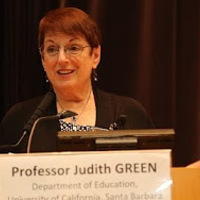
Antonia Darder
Dr. Antonia Darder is a distinguished international Freirean scholar. She is a public intellectual, educator, writer, activist, and artist. She holds the Leavey Presidential Endowed Chair of Ethics and Moral Leadership at Loyola Marymount University, Los Angeles and is Professor Emerita of Education Policy, Organization, and Leadership at the University of Illinois Urbana Champaign. She also holds a Distinguished Visiting faculty post at the University of Johannesburg, in South Africa. Antonia is an American Educational Research Association Fellow and is the recipient of the Paulo Freire Social Justice Award. She has worked tirelessly for more than three decades to fiercely counter social and material inequalities at work in schools and communities.
Antonia’s scholarship has consistently focused on issues of racism, political economy, social justice, and education. Her work critically engages the contributions of Paulo Freire to our understanding of inequalities in schools and society. Darder’s critical theory of biculturalism links questions of culture, power, and pedagogy to social justice concerns in education. Through her scholarship on ethics and moral issues, she articulates a critical theory of leadership for social justice, with a particular focus on the empowerment of subaltern communities.
Antonia is the author of numerous books and articles in the field, including Culture and Power in the Classroom (20th Anniversary edition), Reinventing Paulo Freire: A Pedagogy of Love, A Dissident Voice: Essays on Culture, Pedagogy, and Power and Freire and Education. She is also co-author of After Race: Racism After Multiculturalism and co-editor of The Critical Pedagogy Reader, Latinos and Education: A Critical Reader, and the International Critical Pedagogy Reader, which was awarded the 2016 Alpha Sigma Nu Book Award.
Through the passion of her written and spoken word and the simple beauty of her art, her work has traveled around the world, consistently calling for economic justice, human rights, and cultural democracy for all people. In 2015, Antonia was nominated for the prestigious Brock International Prize in Education and inducted as an American Educational Research Fellow. In 2017, she received the AERA Scholars of Color Lifetime Contribution Award, for her consistent accomplishments over the last four decades.
Phone: 310-338-1608
Address: Loyola Marymount University
University Hall 2300
One LMU Drive
Los Angeles, CA 90045
Antonia’s scholarship has consistently focused on issues of racism, political economy, social justice, and education. Her work critically engages the contributions of Paulo Freire to our understanding of inequalities in schools and society. Darder’s critical theory of biculturalism links questions of culture, power, and pedagogy to social justice concerns in education. Through her scholarship on ethics and moral issues, she articulates a critical theory of leadership for social justice, with a particular focus on the empowerment of subaltern communities.
Antonia is the author of numerous books and articles in the field, including Culture and Power in the Classroom (20th Anniversary edition), Reinventing Paulo Freire: A Pedagogy of Love, A Dissident Voice: Essays on Culture, Pedagogy, and Power and Freire and Education. She is also co-author of After Race: Racism After Multiculturalism and co-editor of The Critical Pedagogy Reader, Latinos and Education: A Critical Reader, and the International Critical Pedagogy Reader, which was awarded the 2016 Alpha Sigma Nu Book Award.
Through the passion of her written and spoken word and the simple beauty of her art, her work has traveled around the world, consistently calling for economic justice, human rights, and cultural democracy for all people. In 2015, Antonia was nominated for the prestigious Brock International Prize in Education and inducted as an American Educational Research Fellow. In 2017, she received the AERA Scholars of Color Lifetime Contribution Award, for her consistent accomplishments over the last four decades.
Phone: 310-338-1608
Address: Loyola Marymount University
University Hall 2300
One LMU Drive
Los Angeles, CA 90045
less
Related Authors
Noel B. Salazar
KU Leuven
Sarah Pink
Monash University
Judith L Green
University of California, Santa Barbara
Michael Spivey
University of California, Merced
George K. # Zarifis
Aristotle University of Thessaloniki
Andreas Umland
National University of "Kyiv-Mohyla Academy"
Alejandra B Osorio
Wellesley College
Andrea Peto
Central European University
David Seamon
Kansas State University
Armando Marques-Guedes
UNL - New University of Lisbon
InterestsView All (20)










Uploads
Journal Articles by Antonia Darder
Design/methodology/approach – This paper provides an introductory essay regarding the contributions and critics associated with Spivak’s work.
Findings – In addition, the contents lay out brief descriptions of the articles included in the collection.
Originality/value – The notion of revisiting “Can the subaltern speak?” provides authors with innovative and provocative ideas to guide their submissions.
Keywords - Qualitative research, Postcolonial, Spivak, Subaltern
Design/methodology/approach – The paper draws from the decolonizing and post-colonial theoretical tradition, with a specific reference to Gayatri Chakravorty Spivak’s contribution to this analysis. Findings – Through a critical discussion of decolonizing concerns tied to qualitative interpretive interrogations, the paper points to the key assumptions that support and reinforce the sensibilities of subaltern voices in efforts to move western research approaches toward anti-colonial possibilities. In the process, this discussion supports the emergence of an itinerant epistemological lens that opens the field to decolonizing inquiry.
Practical implications – Its practical implications are tied to discursive transformations, which can impact social and material transformations within the context of research and society.
Originality/value – Moreover, the paper provides an innovative rethinking of interpretive research, in an effort to extend the analysis of decolonizing methodology to the construction of subaltern inspired intellectual labor.
Keywords Interpretive research, Post-colonial, Decolonizing, Knowledge production, Subaltern voice
"authority of lived experience" (Teaching to Transgress, hooks, 1994) of the researcher. Hence, bodies of research produced within the context of hegemonic epistemologies and traditional
research priorities are analyzed, deconstructed, and reinvented, as we say in the Freirian tradition, in ways that dialectically posit decolonizing meanings to support emancipatory praxis and social change
Design/methodology/approach – This paper provides an introductory essay regarding the contributions and critics associated with Spivak’s work.
Findings – In addition, the contents lay out brief descriptions of the articles included in the collection.
Originality/value – The notion of revisiting “Can the subaltern speak?” provides authors with innovative and provocative ideas to guide their submissions.
Keywords - Qualitative research, Postcolonial, Spivak, Subaltern
Design/methodology/approach – The paper draws from the decolonizing and post-colonial theoretical tradition, with a specific reference to Gayatri Chakravorty Spivak’s contribution to this analysis. Findings – Through a critical discussion of decolonizing concerns tied to qualitative interpretive interrogations, the paper points to the key assumptions that support and reinforce the sensibilities of subaltern voices in efforts to move western research approaches toward anti-colonial possibilities. In the process, this discussion supports the emergence of an itinerant epistemological lens that opens the field to decolonizing inquiry.
Practical implications – Its practical implications are tied to discursive transformations, which can impact social and material transformations within the context of research and society.
Originality/value – Moreover, the paper provides an innovative rethinking of interpretive research, in an effort to extend the analysis of decolonizing methodology to the construction of subaltern inspired intellectual labor.
Keywords Interpretive research, Post-colonial, Decolonizing, Knowledge production, Subaltern voice
"authority of lived experience" (Teaching to Transgress, hooks, 1994) of the researcher. Hence, bodies of research produced within the context of hegemonic epistemologies and traditional
research priorities are analyzed, deconstructed, and reinvented, as we say in the Freirian tradition, in ways that dialectically posit decolonizing meanings to support emancipatory praxis and social change
Key words: decolonizing, dance pedagogy, bicultural development, community-based practice, early childhood education